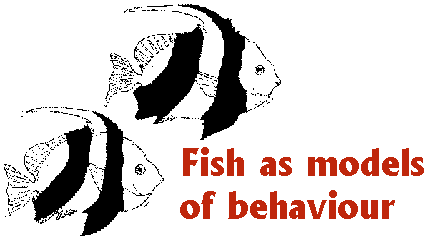Symposium 2003: Fish as models of behaviour, University of East Anglia Norwich, UK, 30th June to 4th July
Fish are the most species-rich vertebrate taxon. They exhibit virtually every imaginable mode of sex determination, and pattern of mating, parental care, foraging and habitat use. It is, therefore, not surprising that fish have long been favoured subjects in studies aimed at understanding the proximate and ultimate bases of behaviour. But how good are fish as models of behaviour? Have they provided scientists with unique insights into the causes and evolution of behaviour? How different are they from other taxa? These questions will be explored in the main themes of the symposium.
Themes
The Jack Jones Memorial Lecture
Prof. Manfred Milinski (Max Planck Institute of Limnology, Ploen, Germany)
The function of mate choice in sticklebacks
Invited Speakers
The programme will be structured around the following themes:
- Fish as models of sexual selection and parental care
Mate choice and sexual competition (at the levels of organism and gamete), hermaphroditism and sex change, speciation, parental care, filial cannabilism, parent-offspring conflict.Keynote Address - Prof. Trond Amundsen (Norwegian University of Science and Technology)
"Sexual selection and ornamentation" - Fish as models for foraging theory
Foraging theory, predator-prey relationships, anti-predator behaviourKeynote Address - Dr. David Sims (Marine Biological Association, Plymouth)
"Foraging behaviour of elasmobranchs" - Fish as models of dispersal and habitat choice
Migration, ideal-free distribution and buffer effects, territoriality, larval settlement. - Fish as models of conflict and cooperation
Intra- and inter-specific interactions, conflicts between sexes.Keynote Address - Prof. Michael Taborsky (University of Bern, Switzerland)
"Conflict and cooperation"
Throughout each topic, we hope to highlight how fish have advanced our general understanding of behaviour and how they resemble, or differ from, other taxa.

Conveners
Isabelle Côté
